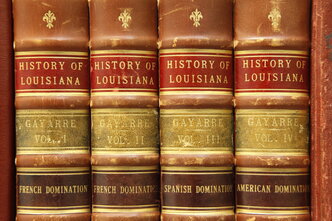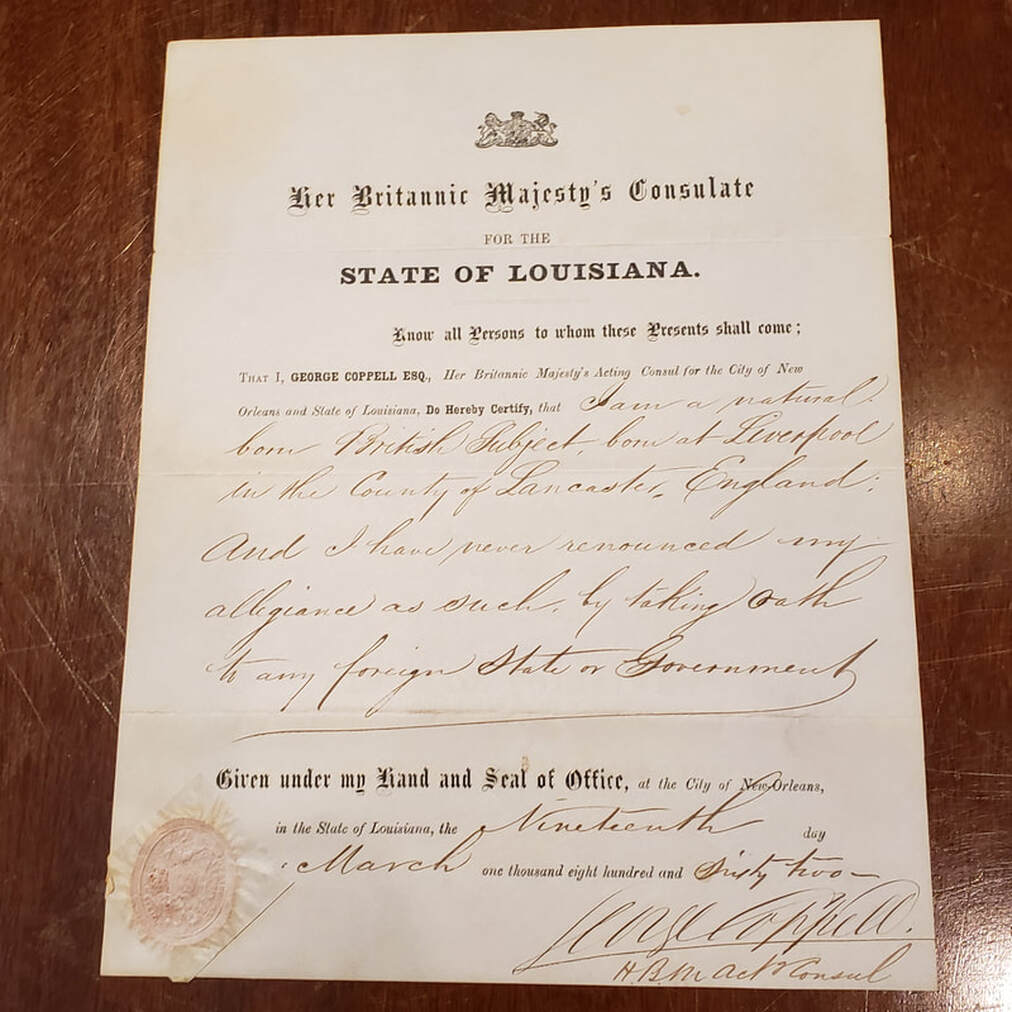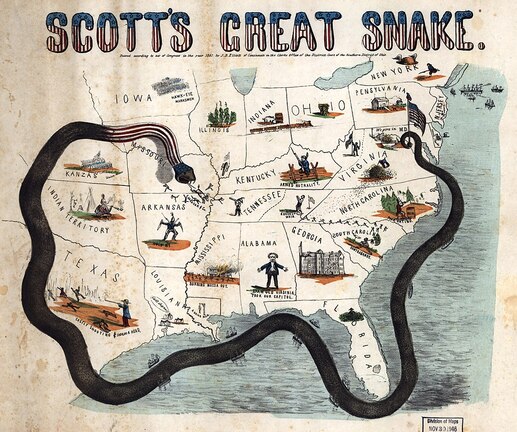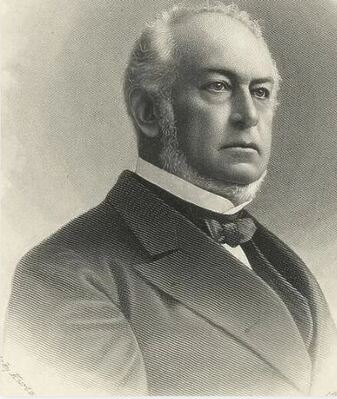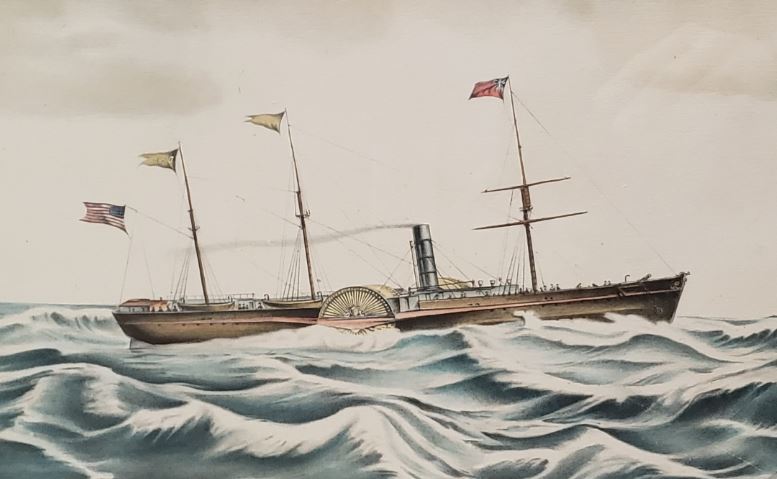THE COPPELL PAPERS
1857 - 1866
1857 - 1866
LOUISIANA HISTORICAL CENTER
|
Click
|
Click
|
Click
|
Click
|
New Orleans: 1857 - 1866
The documents below are labeled as follows.
Labels which are underlined are linked to photos of the documents.
LHC document: Items in The Coppell Papers in the Louisiana Historical Center
Reference document: Items found from other sources about George Coppell
during the referenced time period.
The documents below are labeled as follows.
Labels which are underlined are linked to photos of the documents.
LHC document: Items in The Coppell Papers in the Louisiana Historical Center
Reference document: Items found from other sources about George Coppell
during the referenced time period.
1857 - 1859
George Coppell emigrates from Liverpool, England to New Orleans.
1859
George Coppell obtains employment in the old established English banking house of A. & J. Dinistown & Co.
1860
George Coppell becomes the assistant of William Muir, Esq., the British Consul at New Orleans.
George Coppell emigrates from Liverpool, England to New Orleans.
1859
George Coppell obtains employment in the old established English banking house of A. & J. Dinistown & Co.
1860
George Coppell becomes the assistant of William Muir, Esq., the British Consul at New Orleans.
Reference document: Cotton Trade in 1860
The value of New Orleans' trade with the British Isles, the principal trading partner of the United States in 1860, exceeded the value of trade with all other foreign countries and all domestic regions in 1855 and 1860. Cotton represented the largest share of exports to both Great Britain and France.
The value of New Orleans' trade with the British Isles, the principal trading partner of the United States in 1860, exceeded the value of trade with all other foreign countries and all domestic regions in 1855 and 1860. Cotton represented the largest share of exports to both Great Britain and France.
4/12/1861: The Civil War Starts
After the outbreak of the Civil War, exports from New Orleans from southern cotton plantations helped finance the South's succession from the union. As Confederate currency soon became worthless and "cotton was king." Most of the cotton was exported to textile factories in the United Kingdom which represented a large portion of Britain's GDP. As Acting Consul responsible for that trade, George suddenly found himself in a very important position representing British merchants and sailing vessels, communicating with Major General Ben Butler after the Union took New Orleans as well as the British Foreign Secretary in London and the British Ambassador to the United States in Washington, D.C.
3/14/1862
George Coppell and Helen Hoffman Gillingham are married in New Orleans.
George Coppell and Helen Hoffman Gillingham are married in New Orleans.
LHC document dated: 3/19/1862 - George Coppell become British Acting-Consul
Below is the certification that George Coppell, ESQ., Acting British Consul, was a natural born British subject. It is assumed that this certification document was signed just after George Coppell assumed the role of Acting-Consul after the death of the Consul, William Mure.
That corresponds with the statement in George Coppell's obituary in the Times newspaper in Englewood, N.J. where it states that, "A short time before Admiral Farragut's fleet passed Forts St. Philip and Jackson in 1862, Mr. Mure, the English Consul, died leaving the consulate with no one in charge but young Coppell." Farragut's fleet passed Jackson on 4/18/1862.
At the age of 24 years old, George Coppell found himself in a position of great responsibility.
Below is the certification that George Coppell, ESQ., Acting British Consul, was a natural born British subject. It is assumed that this certification document was signed just after George Coppell assumed the role of Acting-Consul after the death of the Consul, William Mure.
That corresponds with the statement in George Coppell's obituary in the Times newspaper in Englewood, N.J. where it states that, "A short time before Admiral Farragut's fleet passed Forts St. Philip and Jackson in 1862, Mr. Mure, the English Consul, died leaving the consulate with no one in charge but young Coppell." Farragut's fleet passed Jackson on 4/18/1862.
At the age of 24 years old, George Coppell found himself in a position of great responsibility.
LHC document undated
George Coppell British Vice Consul, New Orleans. Foreign Office Instructions for Vice Consuls.
George Coppell British Vice Consul, New Orleans. Foreign Office Instructions for Vice Consuls.
5/1/1862: Union forces take control of New Orleans
Federal troops under the command of General Benjamin Butler occupy the city. At that time, New Orleans was the second largest financial center in the country behind New York. As stated in the doctoral dissertation by Elisabeth Joan Doyle,
|
"Almost 32,000 sea-going vessels and 3,566 river steamers, with an aggregate tonnage of 1,212,029 tons were tied up at the noisy, bustling levees during the last years before the war.
"The street along the river were lined with great warehouses and with the huge cotton presses that made the city the chief cotton export center of North America." |
The bulk of that cotton was exported to textile factories in the UK and as Acting Consul, George had responsibility for those vessels when they were docked in New Orleans. Labeled "The Anaconda Plan", the blockade shut off exports and crippled the Confederacy.
Reference document dated: after 5/6/1862
Letter from British Ministers in Washington to The Foreign Secretaries in London, 1844 to 1867 regarding quantity of cotton destroyed at New Orleans.
Letter from British Ministers in Washington to The Foreign Secretaries in London, 1844 to 1867 regarding quantity of cotton destroyed at New Orleans.
Reference document dated: 5/12/1862
Letter to Major General B.F. Butler protesting the Netherlands Embassy being forcibly entered. It is signed by all of the foreign consuls including George Coppell. His responded two days later.
Letter to Major General B.F. Butler protesting the Netherlands Embassy being forcibly entered. It is signed by all of the foreign consuls including George Coppell. His responded two days later.
Reference document dated: 5/14/1862
Reply from Major General B.F. Butler. "Having prostituted your flag to a base purpose, you could not hope to have it respected.
Reply from Major General B.F. Butler. "Having prostituted your flag to a base purpose, you could not hope to have it respected.
Reference document dated: 7/5/1862
Letter to Major General B.F. Butler from George Coppell regarding an "offensive expression" and him doubting his official position.
Letter to Major General B.F. Butler from George Coppell regarding an "offensive expression" and him doubting his official position.
LHC document dated: 3/22/1864
Letter from George Coppell, then Acting-Consul, to Lord Russell asking to be promoted to the position of Consul.
Letter of recommendation signed by British merchants of the city.
Letter from George Coppell, then Acting-Consul, to Lord Russell asking to be promoted to the position of Consul.
Letter of recommendation signed by British merchants of the city.
4/19/1864
Elizabeth Cordelia Coppell is born.
Elizabeth Cordelia Coppell is born.
LHC document undated
This document appears to be a prescription and mentions a dose for an adult and half for child. There is no date on this document, so it unknown when it was written. Since it mentions the dose for a child, it is assumed it was written after the birth of their first child.
This document appears to be a prescription and mentions a dose for an adult and half for child. There is no date on this document, so it unknown when it was written. Since it mentions the dose for a child, it is assumed it was written after the birth of their first child.
Reference document dated: 5/14/1864
The Foreign Office List which was compiled in 1865 states that the British Consul, Denis Donohoe, in Buffalo, N.Y. was transferred to New Orleans on 5/14/1864. He didn't arrive in New Orleans until after George Coppell had left for New York on 8/18/1866.
The Foreign Office List which was compiled in 1865 states that the British Consul, Denis Donohoe, in Buffalo, N.Y. was transferred to New Orleans on 5/14/1864. He didn't arrive in New Orleans until after George Coppell had left for New York on 8/18/1866.
LHC document dated: 5/23/1864
Letter from George Elliot on behalf of Lord Russell to George Coppell with regard to his application to become Consul. He states that Lord Russell has chosen Denis Donohoe who is the Consul in Buffalo for the position.
Letter from George Elliot on behalf of Lord Russell to George Coppell with regard to his application to become Consul. He states that Lord Russell has chosen Denis Donohoe who is the Consul in Buffalo for the position.
LHC document dated: 8/10/1864
Letter from Lord Richard Lyons who was the British Minister to the United States in Washington D.C. from 1858 to 1865. On July 7, 1864, George Copell apparently sent a letter to him asking to be relieved of the office of Acting Consul. Lyons refers to his many years of good service.
Letter from Lord Richard Lyons who was the British Minister to the United States in Washington D.C. from 1858 to 1865. On July 7, 1864, George Copell apparently sent a letter to him asking to be relieved of the office of Acting Consul. Lyons refers to his many years of good service.
LHC document dated: 12/29/1864
Letter from Denis Donahoe who was the British Consul in Buffalo, NY to George Coppell saying that he has been given his marching order and is coming to New Orleans. He later asks George Coppell to spend a day or two with him before he leaves in order to obtain the benefit of the experience that he acquired. George Coppell did not leave for New York until July of 1866. See the telegram from Denis Donohoe to George Coppell on 7/9/1866 stating that he will arrange everything with foreign affairs.
Letter from Denis Donahoe who was the British Consul in Buffalo, NY to George Coppell saying that he has been given his marching order and is coming to New Orleans. He later asks George Coppell to spend a day or two with him before he leaves in order to obtain the benefit of the experience that he acquired. George Coppell did not leave for New York until July of 1866. See the telegram from Denis Donohoe to George Coppell on 7/9/1866 stating that he will arrange everything with foreign affairs.
LHC document dated: 3/11/1865
Letter from Helen Hoffman Gillingham to her niece, Mary, where she gives her ten shares of gas stock worth $1,350 or $26,000 in current value. This testifies to the fact that George Coppell's wife, Helen Hoffman Gillingham came from a wealthy New Orleans family.
Letter from Helen Hoffman Gillingham to her niece, Mary, where she gives her ten shares of gas stock worth $1,350 or $26,000 in current value. This testifies to the fact that George Coppell's wife, Helen Hoffman Gillingham came from a wealthy New Orleans family.
4/9/1865
George Coppell and his wife, Helen Hoffman Gillingham, leave New Orleans by ship for New York, arriving there on 4/18/1865 where they stayed for ten days before departing to Liverpool.
George Coppell and his wife, Helen Hoffman Gillingham, leave New Orleans by ship for New York, arriving there on 4/18/1865 where they stayed for ten days before departing to Liverpool.
5/9/1865
They depart New York for Liverpool on the ship City of Baltimore and arrive there on 5/11/1865. Presumably, while in Manchester, he meets with his parents, who had not met Helen, and also with his brother Alfred. Alfred acted as his shipping agent when he had wine shipped from Koblenz to New Orleans. It is assumed that this was their delayed honeymoon trip which had been put off because of the war. On 6/17/1865, they left for tour of Belgium, The Netherlands, Germany, Switzerland and France, staying at some of the most prestigious hotels in Europe. See the Folio section to learn more.
They depart New York for Liverpool on the ship City of Baltimore and arrive there on 5/11/1865. Presumably, while in Manchester, he meets with his parents, who had not met Helen, and also with his brother Alfred. Alfred acted as his shipping agent when he had wine shipped from Koblenz to New Orleans. It is assumed that this was their delayed honeymoon trip which had been put off because of the war. On 6/17/1865, they left for tour of Belgium, The Netherlands, Germany, Switzerland and France, staying at some of the most prestigious hotels in Europe. See the Folio section to learn more.
5/26/1865: The Civil War Ends
6/17/1865
George and Helen Coppell depart Liverpool for Dover and cross the channel to Ostende. They visit the cities of Ghent, Antwerp, Brussels, Aix-la-Chapelle(Aachen), Cologne, Koblenz, Wiesbaden, Frankfurt, Heidelberg, Baden-Baden, Strasburg, Bar-le-Duc, and Paris. While in Coblenz, they must have visited the J.N. Schurz winery and arranged to have cases of wine sent to New Orleans. See the Folio section for more info.
George and Helen Coppell depart Liverpool for Dover and cross the channel to Ostende. They visit the cities of Ghent, Antwerp, Brussels, Aix-la-Chapelle(Aachen), Cologne, Koblenz, Wiesbaden, Frankfurt, Heidelberg, Baden-Baden, Strasburg, Bar-le-Duc, and Paris. While in Coblenz, they must have visited the J.N. Schurz winery and arranged to have cases of wine sent to New Orleans. See the Folio section for more info.
LHC document dated: 6/30/1865, 7/30/1865 and 8/17/1865
Bill dated 7/30/1865 for ten boxes of sparkling wine from J.N. Schurz winery in Coblenz, Germany. Letter dated 8/17/1865 from J.N. Schurz to George Coppell, ESQ care of Alfred Coppel, ESQ (George's brother) in Manchester. He states that his agent in Rotterdam will ship the wine from Havre and they will only put it on vessel sailing directly to New Orleans. Perhaps the wine was to celebrate the end of the war.
Bill dated 7/30/1865 for ten boxes of sparkling wine from J.N. Schurz winery in Coblenz, Germany. Letter dated 8/17/1865 from J.N. Schurz to George Coppell, ESQ care of Alfred Coppel, ESQ (George's brother) in Manchester. He states that his agent in Rotterdam will ship the wine from Havre and they will only put it on vessel sailing directly to New Orleans. Perhaps the wine was to celebrate the end of the war.
LHC document dated: 1866
New Orleans Board of Brokers - George Coppell listed as member.
New Orleans Board of Brokers - George Coppell listed as member.
LHC document dated: 3/2/1866
Custom House request to George Coppell to pay duties on imports aboard ship Barcelona from Liverpool. These may have been more wine imports from Germany.
Custom House request to George Coppell to pay duties on imports aboard ship Barcelona from Liverpool. These may have been more wine imports from Germany.
LHC document dated: 5/31/1866
Receipts for Broker's tax.
Receipts for Broker's tax.
LHC document dated: 6/27/1866
Telegraph from from Royal Phelps in New York to George Coppell in New Orleans asking him if he would accept a job as corresponding clerk at the slary of $3,000 or $4,000.
Telegraph from from Royal Phelps in New York to George Coppell in New Orleans asking him if he would accept a job as corresponding clerk at the slary of $3,000 or $4,000.
LHC document dated: 6/28/1866
Letter to George Coppell discussing his position and confirming the salary of $3,00 to $4,000/year. The letter was read by George Coppell on July 4th and replied to on July 10th. $4,000 in 1866 is equivalent to about $83,000 today.
Letter to George Coppell discussing his position and confirming the salary of $3,00 to $4,000/year. The letter was read by George Coppell on July 4th and replied to on July 10th. $4,000 in 1866 is equivalent to about $83,000 today.
LHC document dated: 6/28/1866
Telegraph from from Royal Phelps to George Coppell regarding being in New York within the time stated.
Telegraph from from Royal Phelps to George Coppell regarding being in New York within the time stated.
LHC document date: 6/29/1866
This must have been George Coppell's reply letter to Royal Phelps which was then sent by telegraph. He states that if they can wait six or eight weeks until he is relieved of charge of Consulate, he accepts.
This must have been George Coppell's reply letter to Royal Phelps which was then sent by telegraph. He states that if they can wait six or eight weeks until he is relieved of charge of Consulate, he accepts.
LHC document date: 6/29/1866
Letter from George Coppell to Royal Phelps referring to the job offer and his need for six or eight weeks before leaving. He states that he has found someone to replace him. Interestingly, he states, "I think it proper lost on (on the fact) that though I have a knowledge of the French language, I am not sufficiently 'au fait' (acquainted) to correspond in it. I shall be glad to know if it is essential in the situation (that) you have so kindly offered me." He also says that because of the moving expenses, he is asking for the larger amount of $4,000/year.
Letter from George Coppell to Royal Phelps referring to the job offer and his need for six or eight weeks before leaving. He states that he has found someone to replace him. Interestingly, he states, "I think it proper lost on (on the fact) that though I have a knowledge of the French language, I am not sufficiently 'au fait' (acquainted) to correspond in it. I shall be glad to know if it is essential in the situation (that) you have so kindly offered me." He also says that because of the moving expenses, he is asking for the larger amount of $4,000/year.
LHC document dated: 6/30/1866
Letter from George Coppell to Maitland, helps & Co. stating, "Your letter satisfactory if mine of 29th is acceptable to you."
Letter from George Coppell to Maitland, helps & Co. stating, "Your letter satisfactory if mine of 29th is acceptable to you."
LHC document dated: 6/30/1866
Letter from George Coppell to Denis Donohoe regarding him departing in mid-August. He mentions the job offer from Maitland, Phelps and Company and informed his assistant (?) Montgomery & Edwin Briggs about it. He suggested that Briggs could take charge of the office until he arrived. He questioned if Donohoe needed to write England to get approval.
Letter from George Coppell to Denis Donohoe regarding him departing in mid-August. He mentions the job offer from Maitland, Phelps and Company and informed his assistant (?) Montgomery & Edwin Briggs about it. He suggested that Briggs could take charge of the office until he arrived. He questioned if Donohoe needed to write England to get approval.
LHC document dated: 7/9/1866
Telegraph from Dennis Donahoe in Buffalo to George Coppell saying, "I will arrange everything with foreign affairs." Donahoe assumed George Coppell's role after he left for New York.
Telegraph from Dennis Donahoe in Buffalo to George Coppell saying, "I will arrange everything with foreign affairs." Donahoe assumed George Coppell's role after he left for New York.
LHC document dated: 7/6/1866
Telegraph from Maitland, Phelps & Co. to George Coppell saying, "All right" with regard to new his new position.
Telegraph from Maitland, Phelps & Co. to George Coppell saying, "All right" with regard to new his new position.
LHC document dated: 7/21/1866
Letter from George Coppell to Royal Phelps regarding his departure from New Orleans. George Coppell's new job was as Royal Phelp's confidential clerk. After his death, George became a named partner in the firm.
Letter from George Coppell to Royal Phelps regarding his departure from New Orleans. George Coppell's new job was as Royal Phelp's confidential clerk. After his death, George became a named partner in the firm.
LHC document dated: 8/16/1866
Telegraph from George Coppell to Maitland, Phelps & Co. stating that he will be leaving on Saturday, 8/18/1866 on the steamship Monterey.
Telegraph from George Coppell to Maitland, Phelps & Co. stating that he will be leaving on Saturday, 8/18/1866 on the steamship Monterey.
LHC document dated: 9/15/1867
Letter from Lord Richard Lyons who was the British Minister to the United States in Washington D.C. from 1858 to 1865. When this was written, he was the British Ambassador to France which was the most prestigious office in the British Service. It is really quite a remarkable letter where he praises his work as Acting Consul and states "Your duties were very important, as well as difficult and delicate, and you performed them entirely to my satisfaction." Richard was the son of Admiral Edmund Lyons, and he was highly respected by Queen Victoria. He references working with him from the Autumn of 1861 until he left America at the end of 1864. See letter above from August, 1864.
Letter from Lord Richard Lyons who was the British Minister to the United States in Washington D.C. from 1858 to 1865. When this was written, he was the British Ambassador to France which was the most prestigious office in the British Service. It is really quite a remarkable letter where he praises his work as Acting Consul and states "Your duties were very important, as well as difficult and delicate, and you performed them entirely to my satisfaction." Richard was the son of Admiral Edmund Lyons, and he was highly respected by Queen Victoria. He references working with him from the Autumn of 1861 until he left America at the end of 1864. See letter above from August, 1864.
COPPELL HISTORICAL SOCIETY, P.O. BOX 1871, COPPELL, TX 75019
[email protected]
The Coppell Historical Society is a 501 (c)(3) non-profit organization
